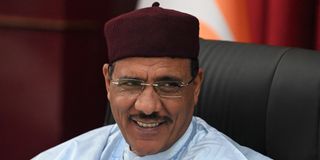Presidency sealed off in coup-prone Niger

Niger's President Mohamed Bazoum attends a meeting with United Nations (UN) Secretary-General Antonio Guterres (not seen) at the presidential palace in Niamey on May 2, 2022. Access to the residence and offices of Niger President Mohamed Bazoum were blocked off on July 26, 2023, by members of the elite Presidential Guard, a source close to Bazoum said, although the reason was unclear.
Access to the residence and offices of Niger President Mohamed Bazoum was blocked off Wednesday by members of the elite Presidential Guard, a source close to Bazoum said, although the reason was unclear.
The landlocked West African state is one of the most unstable nations in the world, experiencing four coups since independence from France in 1960 as well as numerous other attempts on power.
Access was sealed off both to Bazoum's official home and offices in the presidential complex in Niamey, although there was no abnormal military deployment or sounds of gunfire in the area, and traffic was normal, an AFP journalist saw.
Bazoum, who was democratically elected in 2021, is a close ally of France.
The country's last coup occurred in February 2010, overthrowing then president Mamadou Tandja.
However, there was an attempted putsch on March 31, 2021, just two days before Bazoum's inauguration, according to a security source at the time.
Several people were arrested, including the suspected ringleader, an air force captain named Sani Gourouza.
He was arrested in neighbouring Benin and handed over to the Niger authorities.
Ousmane Cisse, a former interior minister under a military government of transition that ran from 2010-2011, was later detained for his suspected role in the attempted coup.
A second bid to oust Bazoum occurred in March this year "while the president... was in Turkey," according to a Niger official, who said an arrest was made.
The authorities have never commented publicly on the incident.
In January 2018, nine soldiers and a civilian were sentenced by a military court to jail terms ranging from five to 15 years for having attempted to topple Bazoum's predecessor, Mahamadou Issoufou, in 2015.
Those convicted included General Souleymane Salou, a former army chief of staff and a member of the junta that had forced out Tandja in 2010.
Lying in the heart of the Sahel, Niger is two-thirds desert and persistently ranks at the bottom, or near it, in the UN's Human Development Index, a benchmark of prosperity.
It has a surging population of 22.4 million, driven by a birthrate averaging seven children per woman.
The country is struggling with two jihadist campaigns -- one in the southwest, which swept in from neighbouring Mali in 2015, and the other in the southeast, involving jihadists based in northeastern Nigeria.





